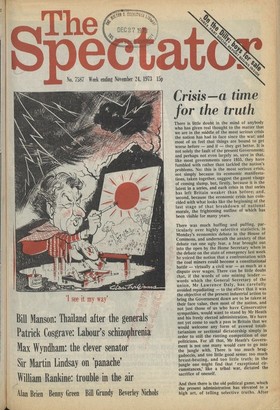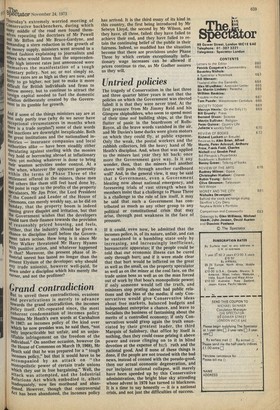c , • •
rtsts a time for the truth
There is little doubt in the mind of anybody who has given real thought to the matter that we are in the middle of the most serious crisis the nation has had to face since the war; and most of us feel that things are bound to get worse before — and if — they get better. It is not solely the fault of the present Government; and perhaps not even largely so, save in that, like most governments since 1955, they have fumbled with rather than tackled the nation's problems. No: this is the most serious crisis, not simply because its economic manifestations, taken together, suggest the gaunt visage of coming slump, but, firstly, because it is the latest in a series, and each crisis in that series has left Britain weaker than before; and, second, because the economic crisis has coincided with what looks like the beginning of the last stage of that breakdown of national morale, the frightening outline of which has been visible for many years.
There was much huffing and puffing, particularly over highly selective statistics, in Monday's economics debate in the House of Commons, and underneath the anxiety of that debate ran one ugly fear, a fear brought out into the open by the Home Secretary when in the debate on the state of emergency last week he voiced the notion that a confrontation with the coal miners could become a constitutional battle — virtually a civil war — as much as a dispute over wages. There can be little doubt that, if the words of one mining leader — words which the General Secretary of the union, Mr Lawrence Daly, has carefully avoided repudiating — to the effect that it was the objective of the present industrial action to bring the Government down are to be taken at their face value, then most of the nation, and not just those of us who have Cohservative sympathies, would want to stand by Mr Heath and his freely elected administration. We have not yet come to such a pass in Britain that we would welcome any form of avowed totalitarianism or sectional dictatorship simply in order to still the ranting competition of our politicians. For all that, Mr Heath's Government is not one many would care to go into the jungle with. There is too much braggadoccio, and too little good sense; too much breast-beating, and too little truth; in the jungle one might find that 'exceptional circumstances,' like a tribal war, dictated the sacrifice of oneself.
And then there is the old political game, which the present administration has elevated to a high art, of telling selective truths. After Thursday's extremely worried meeting of Conservative backbenchers, during which many middle of the road men found themselves repeating the doctrines of Mr Powell and Mr Biffen and Mr Bruce-Gardyne, and foanding a stern reduction in the growth of life money supply, ministers went around in a Pained fashion explaining to journalists and Others who would listen that the unpreceden,*(1,_ IY high interest rates just announced were themselves the manifestation of a tough illonetary policy. Not so; or not simply so. interest rates are as high as they are now, and aik,elY to go higher, not just to make it more k_uffficult for British individuals and firms to rrrow money, but to continue to attract the foreign capital needed to fuel the domestic Inflation deliberately created by the Government in its gamble for growth.
And if some of the things ministers say are at best only partly true (why do we never have exceptional circumstances in months when there is a trade surplus?) some of their words and inactions are downright inexplicable. Both the great institutions and the nationalised industries — insurance companies and local authorities alike — have been steadily either speculating against sterling with the monies they hold or borrowing abroad at inflationary rates; yet nothing whatever is done to bring their wanton activities under control. At a time when, whatever the apparent generosity Within the terms of Phase Three of the settlement offered to the miners, these men and others like them still feel hard done by, and point in rage to the profits of the property sPeculators, Mr Jim Prior, the Lord President Of the Council and Leader of the House of 0Mmons, can merely weakly say, as he did on °Unday, that the property boom is indeed Causing grave disquiet and irritation, but that the Government wishes that the developers Would turn their finance towards the provision 5 reasonably priced housing, and feels, ittrther, that the industry should be given a °lance to discipline itself before the Govern 111)tent takes action. How long is it since Mr eter Walker threatened Mr Harry Hyams With punitive action, and whatever happened ,to that? Moreover, the present phase of in uUstrial unrest has lasted no longer than the Present Elysium of the developer: why should any trade unionist, however well-paid, lie uown under a discipline which hits merely the earner, and not the profiteer?
Grand contradiction Rut to unveil these contradictions, evasions and prevarications is merely to advance towards the grand contradiction, the incomes Policy itself. Oft-repeated since, the most coherent condemnation of incomes policy remains Mr Heath's own words at Carshalton in 1967: an incomes policy of the kind over Which he now presides was, he said then, "not Only impracticable but unfair, and an unjustifiable infringement on the freedom of the Individual." On another occasion, however (in _(he House of Commons on March 19, 1968), Mr fleath said that he was prepared for a "tough incomes policy," but that it would have to be accompanied by an attack on " the Monopolistic power of certain trade unions Which they use in free bargaining." Well, the attack was attempted, and the Industrial relations Act which embodied it, albeit nadequately, now lies moribund and abandoned. However, though that controversial net has been abandoned, the incomes policy has arrived. It is the third essay of its kind in this country, the first being introduced by Mr Selwyn Lloyd, the second by Mr Wilson, and they have, all three, failed: they have failed to achieve their end, and they have failed to retain the continuing belief of the public in their fairness. Indeed, so muddled has the situation become that there are provisions under Phase Three by which certain exceptionally inflationary wage increases can be allowed if prices continue to rise, as Mr Godber assures us they will.
•
Untried policies
tctes
The tragedy of Conservatism in the last three and three quarter bitter years is not that the policies on which the Government was elected failed: it is that they were never tried. At the first pressure from Mr Jimmy Reid and his Glasgow shipbuilders, who seem to spend most of their time not building ships, at the first flutter of panic in the boardroom of RollsRoyce, all the brave words vanished in the air, and Mr Davies's lame ducks were given motors on which they could fly, at public expense. Only the weak, the postal workers and the rubbish collectors, felt the heavy hand of Mr Heath's discipline. And, when that was applied to the miners last year they hit back: once more the Government gave way. Is it any wonder, then, that the miners feel another shove will push through another cardboard wall? And, in the general view, it may be said that a Government, even a Government bleating now about national emergency, and foreseeing trials of vast strength when its members insist that a challenge to Phase Three is a challenge to the rule of law itself, it may be said that such a Government has contributed as much as any other group to any political or constitutional crisis that may arise, through past weakness in the face of pressure.
If it could, even now, be admitted that the incomes police, is, of its nature, unfair, and can be sustained in a bumbling state only by increasing, and increasingly inefficient, bureaucratic apparatus; if the people could be told that our economic illness can be cured only through hurt; and if it were Made clear that that hurt would be inflicted on the great as well as the small, on the property speculator as well as on the miner at the coal face, on the trade union boss as well as on the man forced out of work by that boss's monopolistic power; if only someone would tell the truth, and ministers stop prating about bad public relations and the bias of the media; if only Conservatives would give Conservative ideas about free markets, balanced budgets and independent enterprise a chance, and leave to Socialists the business of fantasising about the merits of a controlled economy; if only Conservatives would grasp again the truth enunciated by their greatest leader, the third Marquis of Salisbury, that office by itself is nothing, then they could cease prizing it above power and cease clinging on to it in blind devotion at the expense of bez ruth and the national good. And if none of these things is done, if the people are not trusted with the bad news, instead of conned with the pseudo-good, then our actual economic degeneration, and our incipient national collapse, will merely have been speeded up by this Conservative administration, the bright blue sky attending whose advent in 1970 has turned to blackness. It is a time to say honestly — it is a national crisis, and not just the difficulties of success.



































 Previous page
Previous page